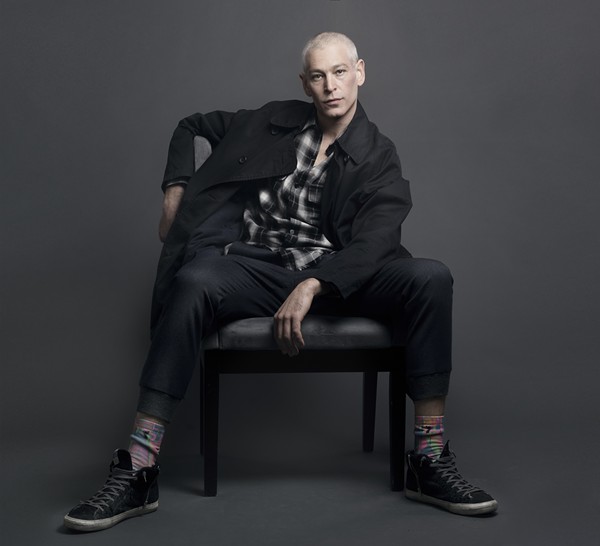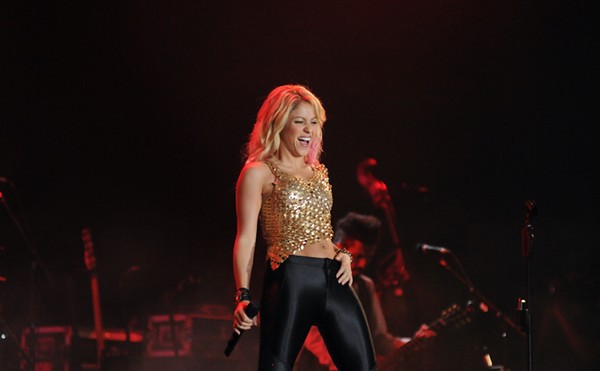I was 18 years old when I bought Youth, the debut LP from the then-Hassidic Jewish rapper Matisyahu. While I was listening to a lot of different types of music in the early aughts, there was something just fucking weird and alluring about this dude rapping/singing/beatboxing in full-on Orthodox Jew ensemble talking spirituality and using a Jamaican accent. And even if you didn't get down with Jehovah, or even listen to reggae, Matisyahu was able to blend in elements of hip-hop and indie rock for a sound that garnered him international recognition and a Grammy-nomination for Best Reggae Album in 2006 for Youth.
The Current caught up with the 38-year-old artist who will be playing a set at The Empire Theatre on Friday, November 3 and has since cut his beard and doesn't wear Hasidic black garb anymore.
Current: I’m actually a really big fan of yours and have been listening to you since the early days at Stubbs. What’s your relationship with Texas anyway? I know you’ve got three live records at Stubbs now, how did all that come together?
Matisyahu: When I signed a record deal, they [the record company] had just put out a record with Los Lonely Boys and Willie Nelson and they had a connection with a sound company out of Texas. So when we were on tour, I signed a record deal while we were on tour, that first tour, [the label] wanted [us] to record a live show immediately and we were passing through Texas … I think they also wanted to keep me, show that it was far away from a bat mitzvah as possible (laughs).
C: (Laughs) Yeah, it was an interesting juxtaposition
M: Yeah, a weird contrast of things.
C: New York Jew rapper in Central Texas-
M: Barbecue sauce
(laughs)
C: (Laughs) Right. So, I actually was a fundamentalist Christian in my early teens, am also a rapper and am also gay and sought solace in a hyper-religious environment. I’m not a Christian anymore but it’s interesting to see you have a similar experience in you walking away from the religious structures in the type of Judaism you were practicing – cutting your beard, etc. I know you probably get asked this a lot, but you can tell me about that whole process of walking away, the shift from that? What prompted the change for seeking something less rigid?
M: Basically when I became religious I didn’t really consider it religious at first. It was more spiritual. And I started doing Mitzvahs, but mainly more doing them because I wanted them out of my own will. At a certain point I was introduced to the concept of giving your will over. And just basically took on more than I would have on my own probably, in terms of the rules and the ideology. It’s hard to live within that context for a certain amount of time. And I know you’ve obviously been through this based on what you just said, but I tried to live within that context and there was a period where I sort of lost myself. I wasn’t myself at all, completely detached, and then there was a period where I came back to myself and tried to figure out how to blend them to live within that context. And then finally I just woke up one day said 'this is my life, it’s not anyone else's, and no one can really tell me about God …'
C: What’s your relationship like now with your higher power, God?
M: My relationship with God, my higher power, was oftentimes based around my struggles. So when I was feeling like I didn’t have the strength to accomplish something, or if I was feeling stuck in an emotional state or something – anxiety or having a breakdown or something like that – my natural tendency was to turn to God, and the religion. I pursued religion and prayer because I wanted that communion [with God]. And I guess where I’m at now, I still have a very core, sort of pure and simple belief in God, but at the same time I’m also very skeptical about any human being being able to believe in God without projecting themselves onto it so … I kinda feel like I’m giving Him a break a little bit … like the way to serve God is to not project myself onto Him and live in a God-silence, if you will … or [live with] a more with an open-ended question mark to [God]?
C: That makes sense to me. I’ve had a lot of conversations with people about religion, spirituality, etc., but I always connected with this lyric, I don’t know if you ever listened to The Indigo Girls, but they had this lyric “The less I seek my source for some definitive, the closer I am to fine.”
M: Yea, that makes sense, that’s very true. I agree with that.
C: Ever since you’ve been putting out records, there’s always been glam-rap, bling, and now in the last couple years there’s been a focus on trap in popular rap music, what are your thoughts on hip-hop today?
M: I mean, there’s some really great rappers out there. I got hooked to Vince Staples a couple years ago and I love him, and Kendrick Lamar. I feel like in every era of hip-hop there’s been fads and there’s been people that write bars regardless. And hip-hop has expanded and it contains all of it, so I don’t know. I like the trap beats and I like hearing people come up with unique ways of using their voice, and I like seeing all the style and seeing hip-hop expand in that dimension as well … into the whole fashion world. It’s cool to see it … These rappers remind me of like, almost hair-rock, rock stars. (laughs). And who stays around after that fad passes, you know what I mean? Like who stays around and continues to make good music? That’s all to be seen.
C: Speaking of people that have stayed around, did you watch Eminem’s Trump verse?
M: Yeah
C: What’d you think about it?
M: I mean, I just didn’t like it because, I mean … When Eminem came out with his style, it was so fresh and dope and new and cool and it was like this certain intensity and anger in his voice … There was a lot of great things about him, but I’ve never been able to hear him rap without that tone, that kind of intense angry tone and when he does now, it just doesn’t have the same affect for me. It’s like 'oh that’s that thing' You know what I mean? Like, oh he’s doing that thing with Trump in mind, like, he hasn’t done that in a long time and now he’s got something to do … I’m not a Trump fan, but –
C: I actually was gonna ask you could too, if there was one thing you could Tweet to Trump and he would actually read it, what would it be? ... from Matisyahu
M: (Laughs) oh shit, OK, what would I say? Lemme think about that for a sec (flicks lighter) … I would just say “why weren’t you at my show the other night in D.C." (laughs).
C: (Laughs) Like "why weren't you at my show bro? We could've talked, you could've gotten loose a little bit."
M: (Laughs) Right? Oh! I was gonna tell you this story.
I used to pray when I was in LA at this very ultra Orthodox very, very religious synagogue where they wear the hats and the socks and the whole thing. And I would go in there dressed like normal street clothes. So one time the rabbi was giving a speech in Yiddish and I couldn’t understand ‘cause I don’t really speak Yiddish and he kept looking at me and then, after I asked somebody what he was talking about, they said 'Oh, about the rule for Jews to separate themselves to look different from non-Jews. And that’s why we have to dress this way' and [the rabbi] was coming down on [people] saying that Jews that don’t dress that way and trying to dress like other people are not making a distinction between themselves and that’s a sin blah blah blah. And I was like so fucked up [about it].
Two years later after I had shaved I was back in that synagogue, I would still go there from time to time to pray, and I’m walking out and that same rabbi who gave that speech comes running up behind me and he goes 'please stop by my house, my wife is a huge fan and she wants to meet you. She needs to meet you,' and I think 'this is kind of weird,' right? ‘Cause they don’t even usually listen to music, you know what I mean? Certainly not my music. So, I go there, I didn't really wanna go, but the guy kinda pushes me into it, and get to the house and I go upstairs and it’s Shabbat, so, you can’t have light, no computers, TV — and I see computers on in the room, and his wife comes out of the room and she’s like 'I want to talk to you alone,' and that’s like really weird, this Hassidic Jew woman wants to talk to me alone … so she comes downstairs and says 'me and my husband are both atheists.'
C: Whoa.
M: And there’s a whole group of people that don’t know how to enter into the world. And she said when I shaved and went on my journey and what not, it inspired her and her husband that one day they’d be basically, able to come out of the closet in the community …
C: I was talking to somebody about what God’s will for our life is or what that looks like, and from my own experience I feel like it's asking the question 'how do I show love and bring hope in the community that I’m in' and for you, you were involved in the Jewish community and your music hit a lot of people, and right there you were able to impact this couple in a way that they were able to understand and see and it was in a way that maybe only you might’ve been able to do, and I think that’s really cool.
M: Thank you man, thank you for following and coming along on the journey.
C: For sure, thanks so much for chatting for a second, looking forward to the show here.
With Common Kings, Orphan, $29-$89, 8pm, Empire Theatre, 226 N. St. Mary's St., majesticempire.com.

















